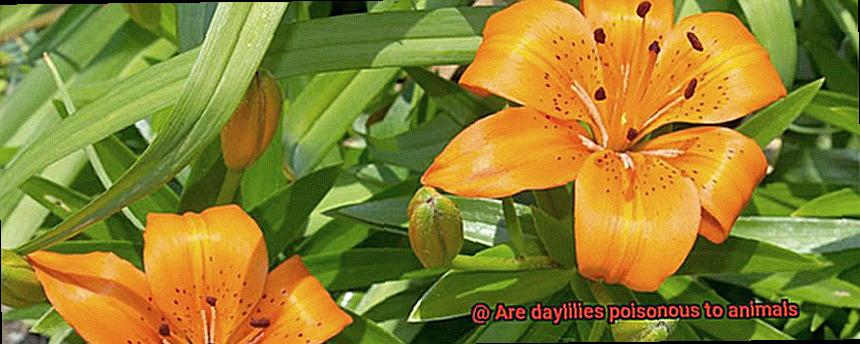As a pet owner and gardening enthusiast, you know how fulfilling it can be to cultivate a beautiful outdoor space. However, not all plants are created equal when it comes to their safety for our furry friends. Daylilies may be a popular choice due to their stunning colors and low maintenance, but are they safe for dogs and cats?
In this blog post, we’ll explore the question of whether daylilies are poisonous to animals and delve into the potential risks they pose to our pets. With their curious nature, dogs and cats may be tempted to nibble on anything in sight – including your garden plants.
The consequences of ingesting daylilies can range from mild symptoms like vomiting and diarrhea to more severe outcomes like kidney failure in cats. While not all species of daylilies are toxic, it’s essential to stay informed as research on plant toxicity is constantly evolving.
We’ll also provide tips on how to maintain a pet-friendly garden with alternative plant options that won’t harm your furry companions. And if an accidental poisoning does occur, we’ll cover the steps you need to take to ensure your pet receives prompt medical attention.
It’s time to prioritize the safety of our beloved pets while still enjoying the beauty of our gardens. Join us as we explore the potential dangers of daylilies and learn how we can create a safe outdoor environment for our four-legged friends.
What are Daylilies?
Contents
These exquisite plants, scientifically known as Hemerocallis, are a genus of flowering plants that belong to the family Asphodelaceae. Daylilies are native to Asia, including China, Korea, and Japan, and are renowned for their vibrant and striking flowers that come in a spectrum of colors such as yellow, orange, red, pink, and purple.
The trumpet-shaped flowers of daylilies have six petals and bloom for only one day before wilting and falling off. Despite their short lifespan, they make a stunning display in gardens and landscapes. Daylilies are hardy perennial plants that grow in clumps with long, narrow leaves that emerge from a central crown. They can range in height from 8 inches to 4 feet depending on the variety. In addition to their ornamental value, daylilies can grow in different soil types and tolerate various environmental conditions, making them a popular choice for gardeners worldwide.
Apart from their aesthetic value, daylilies have also been used for medicinal purposes in traditional Chinese medicine. The flowers and roots of the plant have been used to treat various ailments such as fever, inflammation, and digestive disorders. However, it is important to note that these medicinal properties have not been extensively studied or verified by modern scientific research.
It is vital to understand that all parts of the daylily plant contain a toxin called colchicine. This toxin can be harmful to livestock such as goats if ingested. Symptoms of colchicine poisoning include vomiting, diarrhea, abdominal pain, and even death in severe cases. Therefore, it is crucial to take precautions to ensure your pets’ safety if you have goats or other animals that may come into contact with daylilies.
Are Daylilies Poisonous to Animals?

Yes, it’s true. The entire plant, from the petals to the roots, contains a toxin called colchicine. This substance can cause serious harm if ingested by both humans and animals.
Colchicine poisoning symptoms can range from vomiting and diarrhea to abdominal pain and even death in severe cases. It’s worth noting that the level of toxicity can vary depending on the animal’s size and the amount ingested. As a responsible animal owner, it’s important to know the potential dangers of daylilies and take necessary precautions.
Goats are curious creatures that love to explore their surroundings. If you have daylilies planted in your pasture or around your property, it’s essential to fence off these areas or remove the flowers altogether. This way, you can prevent accidental ingestion of this toxic plant.
As a goat owner, your priority is always the safety and well-being of your animals. While daylilies may be popular for their aesthetic appeal, they pose a significant risk to your goats’ health. Don’t take any chances – always err on the side of caution and take steps to protect your furry friends.
What Toxins are Found in Daylilies?
Colchicine Poisoning in Daylilies – A Serious Health Hazard
Daylilies are known for their vibrant colors and beauty, but it’s important to know that they contain toxins that can be harmful to animals, including humans. One of the primary toxins found in daylilies is colchicine.
This potent alkaloid can cause severe gastrointestinal distress, including vomiting and diarrhea. Ingesting colchicine can also cause damage to the kidneys and liver, leading to potential organ failure. It’s essential to keep daylilies away from animals that may be tempted to eat them. If you suspect your animal has ingested any part of a daylily plant, seek veterinary attention immediately.
Lycorine Poisoning in Daylilies – A Potential Life-Threatening Condition
Apart from colchicine, daylilies also contain another toxic alkaloid called lycorine. This toxin is primarily concentrated in the bulbs and roots of the plant and can cause similar gastrointestinal symptoms as colchicine poisoning. However, in severe cases of poisoning, lycorine can also cause cardiac arrest and respiratory failure, posing a potential life-threatening condition to animals that have ingested it. It’s crucial to know what plants are safe for your pets and which ones are not. Daylilies may be attractive plants, but they can pose a substantial threat to your beloved pets.
The Other Toxins Found in Daylilies
Daylilies contain other toxins such as saponins, glycosides, and carotenoids. These compounds can cause various symptoms, including nausea, vomiting, abdominal pain, and even death in severe cases. It is essential to understand that not all species of daylilies contain the same amount or type of toxins. Some species may be more toxic than others, and the concentration of toxins can vary depending on environmental factors such as soil composition and climate conditions.

Keeping Your Pets Safe from Daylily Poisoning
As a pet owner, it’s your responsibility to keep your animals safe from toxic plants like daylilies. One way to do this is by removing any daylilies from your property or keeping your pets away from areas where these plants are growing. It’s also advisable to train your pets not to eat any plants or flowers they come across while outside, as some may contain harmful toxins. If you suspect that your animal has ingested daylilies, seek veterinary care immediately. Early intervention can make all the difference in preventing serious health complications from toxic exposure.

Symptoms of Daylily Poisoning in Animals

If your furry friends have access to these plants, it’s important to be aware of the symptoms of daylily poisoning. Let’s dive into the symptoms that your pets may exhibit after ingesting daylilies.
The most common sign of daylily poisoning in animals is vomiting and diarrhea. The severity of these symptoms depends on the amount of plant material ingested and the size and species of your pet. In addition, animals may experience abdominal pain and discomfort, as well as a decrease in appetite and lethargy.
Drowsiness is another symptom of daylily poisoning in animals. Your furry friend may appear weak or disoriented and have difficulty standing or walking. In severe cases, animals may even experience seizures or convulsions due to the toxins affecting their nervous system.
Although rare, daylily poisoning can lead to kidney failure in animals, which can be life-threatening if not treated promptly. It’s crucial to note that not all animals will exhibit all of these symptoms, and some may show no symptoms at all.
Prevention and Safety Tips for Pet Owners with Daylilies
While daylilies are gorgeous and add color to any garden, they can be dangerous to pets such as dogs, cats, and goats. That’s why it’s essential for pet owners who have daylilies in their homes or gardens to take precautions to prevent any potential harm.
Here, I will share with you five prevention and safety tips for pet owners with daylilies.
Remove Daylilies from Your Environment
The most effective way to prevent pets from being poisoned by daylilies is to remove them from the environment altogether. If you have pets that are prone to eating plants or if you have a high-risk pet, it is better to avoid planting daylilies in your garden or keeping them indoors.
Keep Daylilies Out of Reach
Suppose you must have daylilies in your garden or home. In that case, it is important to keep them out of reach of your pets by placing them in elevated flower beds or hanging pots where your pet cannot access them. Additionally, you can use physical barriers such as fences or gates to keep pets away from the daylilies.
Train Your Pets Not to Eat Plants
It is also essential to train your pets not to eat any plants they come across, including daylilies. You can use positive reinforcement techniques such as rewards and verbal praise to encourage good behavior and discourage bad behavior. Providing safe and healthy alternative treats for your pets can also help prevent them from eating plants.
Know the Signs of Poisoning
If you suspect that your pet has ingested daylilies or any other toxic plants, it is essential to seek immediate veterinary attention. Signs of poisoning may include vomiting, diarrhea, lethargy, loss of appetite, and seizures. Prompt medical attention can prevent serious health complications and even save your pet’s life.
Consider Alternative Plant Options
There are many alternative plant options for pet owners who want to add some color and beauty to their garden without putting their furry friends at risk. Some great options include marigolds, zinnias, and snapdragons.
Treatment Options for Animal Poisoning from Daylilies
But if your pet has ingested daylilies, it is crucial to act quickly and seek veterinary attention immediately.
When it comes to treatment options, the severity of the symptoms and how much time has passed since ingestion will determine the course of action. Possible treatments include inducing vomiting, administering activated charcoal to absorb toxins, and providing supportive care like IV fluids and medications to control symptoms.
However, if your pet is experiencing severe symptoms such as difficulty breathing or seizures, hospitalization may be necessary. In the most extreme cases, surgery may be required to remove any remaining plant material from the digestive system.
FaHmGPTWhc8″ >
Conclusion
In conclusion, daylilies may be a stunning sight to behold in the garden, but they can also pose a significant threat to our furry companions. These plants contain harmful toxins such as colchicine and lycorine that can lead to severe gastrointestinal distress, organ failure, and even death in extreme cases. Symptoms of daylily poisoning in animals include vomiting, diarrhea, abdominal pain, lethargy, seizures, and drowsiness.
To ensure the safety of our pets around these poisonous plants or any other toxic vegetation, it is crucial to remove them from the environment altogether or keep them out of reach. Additionally, pet owners must train their furry friends not to eat any plants they come across and recognize signs of poisoning. If you suspect that your pet has ingested any toxic plant material like daylilies, seek immediate veterinary attention.
Fortunately for pet owners who want a colorful garden without risking their animal’s health and wellbeing, there are plenty of safe alternatives available. Marigolds, zinnias and snapdragons are just a few examples of beautiful plants that won’t harm your pets.






